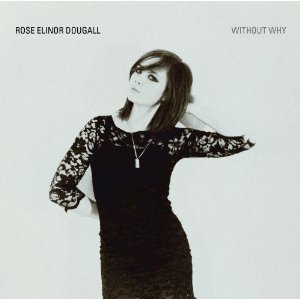Rose Elinor Dougall’s debut album Without Why can hardly be treated as a response to the thriving endeavours of The Pipettes, the polka dot outfit in which we originally encountered her. Work began on it over two years ago, and several of its missives have already made their way into the public domain in that time where, pleasingly, they’ve been devoured with an anticipatory relish. Nevertheless, there is a sense in which it feels like a reaction to audience perceptions and a considered toying with expectations, many of which are based on songs and performances from her teens, surely something few would want as a trapped-in-amber impression. Ironically, though, Rose can’t entirely shake her pop instincts, nor her knack for idly flicking past the most treasured sections of the indie-est of record collections, and, consequently, she’s produced an even stronger solo debut than she may even have intended.
Inevitably, the vocals are unfailingly inviting from the off, melodically effortlessly gymnastic, tonally somewhat confiding, and wrapped in a moreish sweetness whose solid humanism keeps it from ever tipping towards cloying affectation. They therefore lend themselves well to an album that, a little unusually for someone in their early twenties, is reflective in the sort of thoroughly observed manner that even the Delgados didn’t entirely nail until the third album. The lovely music-box reverie ‘May Holiday’, for example, is both photographically detailed and undercurrent-heavy as it brings a profound air of perspective to bear on what her experiences meant both at the time and subsequently. ‘Fallen Over’ and ‘Third Attempt’, while radically diferent sonically (the former’s a puzzled Britpop rush, the latter a more stately slice of explicit melancholy – precisely the trick Lush pulled with the dual release of ‘Hypocrite’ and ‘Desire Lines’), are terrific pick-yourself-up tales of resilient hesitancy.
Moreover, there’s more than an inkling that, stylistically, Rose has frequently dispatched caution to the wind. In fairness, the singles had suggested this to a degree – last year’s fantastic ‘Stop/Start/Synchro’, which launches proceedings here in wonderfully look-at-me! fashion, would’ve worked a treat in the hands of Sandy Denny or Grace Slick but takes a lot of enthusiastic cues from the restless keyboards at play in early Broadcast. ‘Another Version Of A Pop Song’ lurches from its handclaps’n’harpsichord beginnings deep into neo-New Pop territory – but there’s a veritable having-a-bash smorgasbord that hits the mark hugely consistently, with ‘Goodnight”s borderline lachrymose piano and occasional vocal catches being redolent of an English Tori Amos, and the gorgeous ‘Come Away With Me’ fusing Frame c.83 to Fraser c.93. Even if ‘Watching’ probably isn’t meant to sound like an evil Sade, its spartanly unsettling setting explores its obsessive tendencies with keen-eyed relish.
Most of all, though, there’s a real sense of possibility shot through the whole of this album. It’s the sort of record that could undoubtedly nuzzle up to the mainstream with the appropriate push or, just as likely, become one of those cherished-but-uncharting affairs that gets picked up a generation or two hence as a lost curio. What’s really satisfying is that either option would probably be just as welcome. Independence always sounded like it’d suit Rose, but already she’s blossomed more than we’d have dared imagine.


